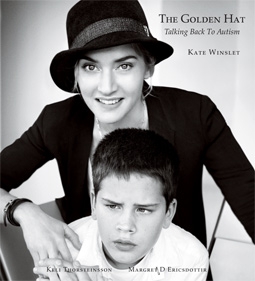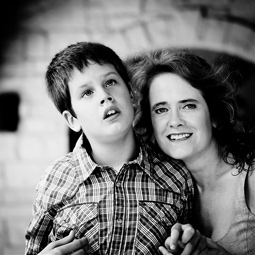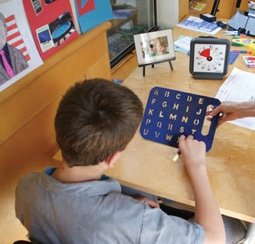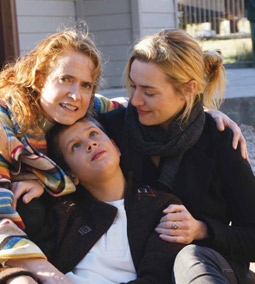
The Golden Hat Foundation is a non-profit organization founded by Icelandic filmmaker Margret Ericsdottir and Oscar winning actress Kate Winslet. The foundation was created to bring awareness to the tens of millions of children and adults who are currently living with a severe form of non-verbal Autism. Margret Ericsdottir’s fourteen year old son, Keli Thorsteinsson, lives with non-verbal Autism. Ericsdottir’s inability to communicate with her own son for the first ten years of his life sent her on a long and arduous journey that eventually culminated in the HBO documentary film, A Mother’s Courage: Talking Back To Autism. The film was produced by Margret and directed by Icelandic Oscar-nominated director Fridrik Thor Fridriksson, with English-language narration by Oscar-winning actress, Kate Winslet (Winslet donated her time to provide narration for the film).
Those who are afflicted with severe non-verbal Autism are shut out of society and isolated from their loved ones because they cannot speak. They are often misunderstood, misdiagnosed and cruelly underestimated in a myriad of ways. Take a moment to stop and think about how life would be if you lost your ability to speak, yet you were still completely aware of the world around you with your inner monologue fully intact. This is the plight of people with non-verbal Autism, and this is the story of an Autistic boy named Keli, his mother Margret, and their good friend and advocate, Kate Winslet. This is the story of The Golden Hat.
Margret Ericsdottir and I sat down for a conversation about the events in her son, Keli’s, life that led to the founding of the Golden Hat Foundation and its flagship project, a book entitled The Golden Hat: Talking Back to Autism, co-written by Kate Winslet.
Icelandic born Margret Ericsdottir is the mother of three beautiful boys. Her youngest son, Keli, happens to suffer from non-verbal Autism, which, according to Ericsdottir, “affects approximately half of the estimated 67 million individuals in the world who are currently living with Autism.” Trapped in an isolated state, unable to speak and with limited body awareness, Margret’s son Keli was dismissed as intellectually incapable for the first ten years of his young life. “[Keli] was diagnosed as mentally retarded with age development of a two-year-old,” recounts Margret. “These kids, they are so different due to their Autism the way they are spinning, flapping their hands, and shaking their head, and because they can’t stay still.” Ericsdottir explains to me that these classic Autistic behaviors are the Autistic person’s attempts to feel and connect to their own body; a way of overcompensating for their lack of body awareness. “So he couldn’t speak, and he is diagnosed by an expert with mental retardation.” Ericsdottir’s voice builds with frustration, her demeanor punctuated by residual feelings of regret.
Ericsdottir is then careful to point out an important distinction, citing that her own son’s experience with Autism may not be the same as that of other children with the disorder. “Autism is a spectrum and each individual is as different as they are many. One hat certainly does not fit all.”
Unable to properly assess Keli’s intellectual capacity due to his non-verbal status, Ericsdottir and her family accepted Keli’s initial diagnosis, providing him with entertainment and toys appropriate to a toddler’s stage of development, even as Keli moved well into his elementary school-age years. “If we did read to him, we read Teletubbies or something like that. But he is so intellectually capable, and probably most of these kids are. They are just imprisoned by their Autism.”
After years of trying to make sense of Keli’s Autism and exhausting every accessible treatment option that she could find, Keli’s mother Margret, along with Keli’s father and their two healthy, typically developing sons, were despondent about Keli’s prospects. Margret decided to make a documentary about Autism in an attempt to heal her own personal pain, but what she discovered would permanently shift her family’s destiny and reveal the very capable mind of her beloved son, Keli.

As we discussed Margret’s initial motivation for making her documentary film, originally titled The Sunshine Boy, Margret grew sullen as she recalled her feelings of helplessness with the condition of her son, Keli, and his grim prognosis. “I had given up hope regarding Keli,” Ericsdottir laments. “I am not very proud to admit it, but that’s how it was. I felt so hollow and empty inside not being able to help my own son.” To redeem what seemed like a lost cause for her own Autistic child, Ericsdottir felt that making a documentary about Autism might help others. “I thought, ok, I can’t help my son. But maybe I can help other parents since early intervention is so important.” Making The Sunshine Boy, a small independent effort in her native Iceland, was a form of catharsis for Ericsdottir, a coming-to-terms and an attempt to process her own grief. And then, a light bulb moment…
While in production on The Sunshine Boy Margret discovered a breakthrough for her son. “We saw a boy who was just as severely Autistic as Keli, named Dov Shestack. He was communicating on a letter board. He was completely non-verbal with very limited body awareness, just like Keli. But he was communicating!” Margret becomes flushed with excitement recalling the simple discovery that changed the course of her son’s life. It was in that moment that Margret began to experience hope. “God, is this something I can do with my son, Keli?!,” was her first thought. Ericsdottir immediately took action. “I went to the same clinic that Dov Shestack had gone to, to learn to communicate. Soma Mukhopadhya, a remarkable teacher, taught Keli to communicate on a letter board.” Keli, who had been diagnosed as having the developmental and intellectual capacity of a two-year-old, began to express intelligent and emotionally aware thoughts and feelings as his fingers moved across the alphabet on the letter board to form words and sentences.
Finally, at the age of ten, Margret’s non-verbal son was communicating with her. I asked Margret, “What was the very first thing Keli said to you using his letter board?” Taking in the enormity of my question Margret shares two phrases with me, “I am real” and “I am nice.” This moment stops us both in our tracks.
“You have to understand,” she explains, “When you get the diagnosis that they are mentally retarded you speak about them in front of them. You don’t speak to them.” When Keli spelled out “I am real” and “I am nice” on his letter board, Margret knew that her non-verbal Autistic son had been absorbing information all along. He had previously been unable to tell her what he knew, what he needed, or even who he was because of his inability to speak. Finally, at the age of ten, Keli was able to properly introduce himself to his parents and his siblings.
Sometimes the complications of Keli’s non-verbal Autism went beyond the everyday frustrations of not being able to emotionally or intellectually connect with his loved ones. Sometimes his non-verbal status impeded his own mother’s ability to help her son when he was sick or injured. With weighted breathe, Ericsdottir recounts how her son Keli’s non-verbal Autism kept her in the dark about a serious medical condition. “Keli had been limping his whole life. I had been taking him to the pediatrician in Iceland all the time because he was limping all the time, and they always told me that he must have just twisted his leg. It’s not easy, even for doctors, to diagnose children with Autism if they don’t speak,” she says.
“When Keli was finally able to communicate his pain with the use of his letter board, he was able to spell out the words, ‘Emergency. Much pain in left foot. Doctor today.’”
It was those words that cued Margret to get Keli the immediate medical help he needed, including an x-ray of his left foot which would reveal a fracture and an eventual diagnosis of osteoporosis. Margret is now investigating the cause of Keli’s premature osteoporosis.
Once completed, Margret’s small Icelandic documentary, The Sunshine Boy, caught the attention of Rosie O’Donnell who promptly brought the film to HBO executives. “It was HBO who renamed the film, A Mother’s Courage: Talking Back to Autism,” explains Margret. “I called the film, The Sunshine Boy, because I am not courageous at all. I made this film for love, not for courage,” she insists. The HBO re-christened A Mother’s Courage: Talking Back To Autism was bought by HBO and the network needed to re-vamp the film for an American audience. Enter Oscar winning actress Kate Winslet who was brought onboard to provide the English-language narration for A Mother’s Courage: Talking Back To Autism.

Margret Ericsdottir and Kate Winslet met at a London recording studio in 2009, a providential meeting that would lead to ongoing correspondence and a deep bond between Kate and Ericsdottir’s son, Keli. Margret and Kate’s relationship led to a long-term effort to bring about global awareness for non-verbal Autism, through the founding of their non-profit organization, the Golden Hat Foundation.
Kate Winslet, the mother of two healthy, typically developing children had no direct link to the effects of Autism, and Margret was overwhelmed by Kate’s altruistic empathy and her desire to become involved. “I am in this out of necessity as the mother of a severely Autistic child. When I met Kate Winslet at the studio I was not expecting any more understanding or support. I was just grateful that she was doing the narration for free,” Ericsdottir states. After a beat and upon further reflection she adds, “This is just one mom helping another mom in her challenges. Me and Kate, we are just moms and first and foremost we love our precious children more than anything and we want to help them become who they are.”
As Keli’s communication skills flourished with the use of a letter board, he began to compose poems and short stories about living with non-verbal Autism. He wrote a poem called “The Golden Hat,” about a boy who had a magical hat that would talk for him, allowing him to break free of his inability to speak.
“Keli was the one who inspired [Kate] to establish this foundation,” insists Margret. Explaining the importance of the Golden Hat Foundation’s work, Ericsdottir details, “We are unlocking intelligence with the foundation. But first we need to educate and inform people that these kids are intellectually capable. They are almost like the forgotten half [of Autism]. They have been so invisible. Why? Because they can’t speak. They can’t say who they are and what they stand for.”
Kate Winslet was struck with the idea to create a coffee table book, entitled, The Golden Hat: Talking Back To Autism, inspired by Keli’s heartfelt poem. The Oscar winning star set about enlisting the help of her famous friends and colleagues in the entertainment industry to bring her vision to life. “Celebrities were sent Kate’s old beaten up trilby [hat] and a camera,” explains Ericsdottir.
Kate Winslet had a simple request for each celebrity who received her worn-in trilby and digital camera: “Take a self-portrait with the hat and imagine a wall between you and those you love, imagine being trapped inside yourself, never being able to express your desires, needs, feelings.” Winslet asked them, with that in mind, to provide a quote that represents who they are. Margret grows brighter as she tells the story of The Golden Hat book. “The celebrities, they were sent Kate’s beaten up old trilby hat and they were also sent a camera. This is all about the importance of self-expression. Who you are and what you stand for. So the way they take the pictures, that is representing who they are at that moment. Also, the quote is representing them. That is communication.”
These celebrity self-portraits and personal quotes would comprise a special book, The Golden Hat: Talking Back To Autism, which gives a glimpse into the private thoughts of some of the world’s most famous people while simultaneously sending a profound message to readers: the ability to speak and to express oneself is something each of us takes for granted. Children like Keli who live with non-verbal Autism recognize that self-expression through speech is a precious gift. With the inception of this book (in bookstores March 27, 2012, Simon & Schuster), the Golden Hat Foundation was born.
Now that the future looks brighter for Keli Thorsteinsson, his proud mom, Margret Ericsdottir, tells me of Keli’s professional ambitions. “Keli wants to be an author. He also wants to make movie scripts, and he is really keen on music as well. He wants to educate people.” Ericsdottir tells me that Keli wrote his own screenplay about Autism, which Ericsdottir showed to Kate Winslet. “I showed the script to Kate Winslet and she just cried. She said, ‘tell Keli that I am going to be part of this documentary and to start shooting on a flip camera.’”

During the HBO documentary film, A Mother’s Courage: Talking Back To Autism, a sentence comes onto the screen which reads, “Unlocking An Autistic Mind.” When I ask Margret if she believes that she has unlocked her son Keli’s mind, she reveals “I feel I have not only unlocked his mind, I have unlocked his personality. But of course, he will grow and mature like each and every one of us. That is what we are trying to do, both with the book and with the foundation, it’s unlocking intelligence. These kids can contribute to society.”
The Golden Hat Foundation has been given the honor of being selected as a partner by the United Nations to host World Autism Awareness Day on April 2, 2012, an event that will include a book signing, a video address by Kate Winslet and a personal introductory speech given by Keli’s mother, Margret Ericsdottir. The UN program will also include a press briefing for the media and a screening of the film, A Mother’s Courage: Talking Back to Autism.
“The Golden Hat: Talking Back To Autism,” a book by Kate Winslet, Margret Ericsdottir & Keli Thorsteinsson is available at bookstores nationwide, at goldenhatfoundation.org and on Amazon.com, March 27, 2012. All proceeds from the sale of the book, “The Golden Hat: Talking Back To Autism” will go directly to Golden Hat Foundation to improve the lives of those living with non-verbal Autism.
If you are a member of the press and are interested in attending World Autism Day at The UN, please visit goldenhatfoundation.org for further information.
Follow the Golden Hat Foundation on Twitter @katewinsletghf.
